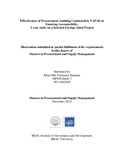Effectiveness of procurement auditing conducted by FAPAD in ensuring accountability: a case study on a selected foreign aided project

View/
Date
2014-12Publisher
BRAC UniversityAuthor
Rahman, Khan Md. FerdausurMetadata
Show full item recordAbstract
The purpose of the present study is to assess the effectiveness of procurement auditing of
Foreign aided projects in Bangladesh, in ensuring the accountability there of. Accountability
is the essence of democratic form of government. As a developing country with limited
resources, Bangladesh is largely dependent on foreign assistance for its national
development. All foreign aid, loan or grant, are part of the consolidated fund of the republic.
Therefore it is of utmost importance for a resource-scarce country like ours to maintain
financial discipline for the optimum utilization of the borrowed money, which adds burden of
debt on the future generation too. Accountability of aided projects is ensured through various
GoB organizations. Audit conducted by Foreign Aided Projects Audit Directorate (FAPAD)
is one such mechanism, the primary responsibility of which is to audit the aided projects and
certify their accounts and issue reports to the donor agencies, besides the parliament and
audited entities. The study area is thus FAPAD, which on behalf of the Comptroller and
Auditor General (C&AG) of Bangladesh, carries out the assigned task.
Needless to say, accountability enhancement in the public sector is a collective responsibility
and each and every institution belonging to this partnership, namely, the parliament, the
public sector and the audit institution, has to play their role effectively. Qualitative and
quantitative data have been collected through content analysis and interviews of
representatives from audit, auditees (project management and line ministry), development
partners and members of PAC to record their views and opinions on the state of procurement
audit effectiveness of donor funded projects in Bangladesh. The analytical framework is thus
developed to examine the factors assumed to influence an effective procurement audit. It was
observed during research that there are certain limitations that affect audit effectiveness of
aided projects. Apart from putting forward some suggestions for the concerned audit
directorate towards the best utilization of its resources, the present study is also expected to
leave scope for the stakeholders of FAPAD audit reports (both preliminary reports and
C&AG’s audit reports) to review their ownership in the chain of the accountability
framework.
